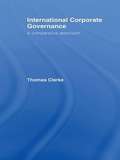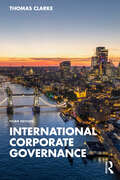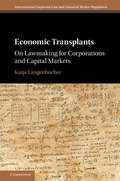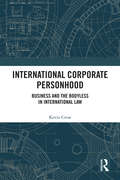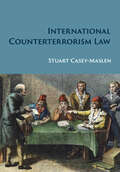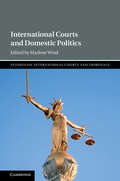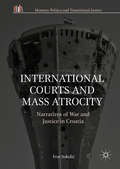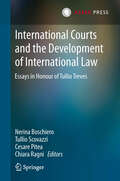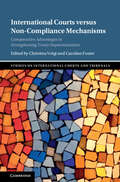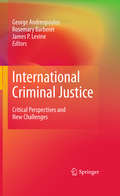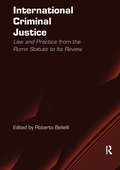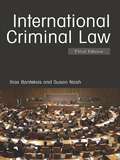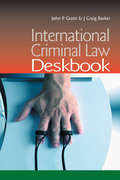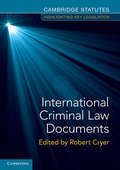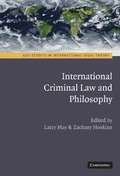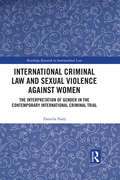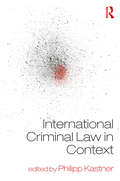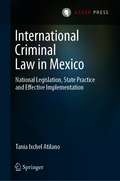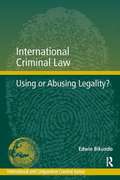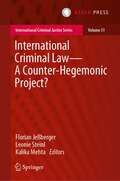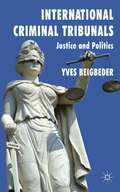- Table View
- List View
International Corporate Governance: A Comparative Approach
by Thomas ClarkeComprehensive and up-to-date, this important textbook analyzes the escalating crisis in corporate governance and the growing interest in its reform across the globe. Written by a leading name in the field of corporate governance from a genuinely international perspective, this excellent textbook provides a balanced analysis of the relative strengths and weaknesses of the Anglo-Saxon, European and Asian traditions of corporate governance; offering a prognosis of the future development, complexity and diversity of corporate governance forms and systems. It: investigates the reasons for the failure of Enron, WorldCom, Tyco, Parmalat and other major international corporations examines the role of international standards of corporate governance, with the intervention of the OECD, World Bank and IMF explores the continuing cultural diversity in corporate and institutional forms in the United States and UK, Europe and Asia Pacific. Illustrated with a wealth of up-to-the minute case studies and packed full of excellent illustrative material that guides student readers through this complex subject, International Corporate Governance is a must read for anyone studying corporate governance today.
International Corporate Governance: A Comparative Approach
by Thomas ClarkeThomas Clarke’s International Corporate Governance offers a panoramic guide to corporate governance and examines the recurring crises in governance and the reform around the world. This is a popular classic book but significant changes have been made to this new edition to take account of: the continuing impact of the global financial crisis and the wave of regulation development flowing from this the profound consequences of climate change and the urgent need for corporations to respond with the commitment to sustainable value creation Important elements of the work include: contemporary governance failures including BP, VW, Boeing, GM/Tesla, Apple, Purdue Pharma, and Theranos; the ongoing vitality of the diversity of corporate governance across the world; digital disruption in capital markets and initiatives to build long-term investment; the universal impact of financialization and resulting increasing inequality; the essential logic of corporate governance and corporate sustainability. The textbook contains a wealth of pedagogical material to guide the reader through this complex subject, with student questions to help with assessments and new companion website. There are 14 new forensic case analyses critically scrutinizing governance failures. International Corporate Governance is an essential text for those studying corporate governance at the advanced undergraduate, postgraduate, or executive level.
International Corporate Law and Financial Market Regulation: On Lawmaking for Corporations and Capital Markets (International Corporate Law and Financial Market Regulation)
by Katja LangenbucherWhy and in what ways have lawyers been importing economic theories into a legal environment, and how has this shaped scholarly research, judicial and legislative work? Since the financial crisis, corporate or capital markets law has been the focus of attention by academia and media. Formal modelling has been used to describe how capital markets work and, later, been criticised for its abstract assumptions. Empirical legal studies and regulatory impact assessments offered different ways forward. This book presents a new approach to the risks and benefits of interdisciplinary policy work. The benefits economic theory brings for reliable and tested lawmaking are contrasted with important challenges including the significant differences of research methodology, leading to misunderstandings and problems of efficient implementation of economic theory's findings into the legal world. Katja Langenbucher's innovative research scrutinises the potential of economic theory to European legislators faced with a lack of democratic accountability.
International Corporate Personhood: Business and the Bodyless in International Law
by Kevin CrowThis book tracks the phenomenon of international corporate personhood (ICP) in international law and explores many legal issues raised in its wake. It sketches a theory of the ICP and encourages engagement with its amorphous legal nature through reimagination of international law beyond the State, in service to humanity. The book offers two primary contributions, one descriptive and one normative. The descriptive section of the book sketches a history of the emergence of the ICP and discusses existing analogical approaches to theorizing the corporation in international law. It then turns to an analysis of the primary judicial decisions and international legal instruments that animate internationally a concept that began in U.S. domestic law. The descriptive section concludes with a list of twenty-two judge-made and text-made rights and privileges presently available to the ICP that are not available to other international legal personalities; these are later categorized into ‘active’ and ‘passive’ rights. The normative section of the book begins the shift from what is to what ought to be by sketching a theory of the ICP that – unlike existing attempts to place the corporation in international legal theory – does not rely on analogical reasoning. Rather, it adopts the Jessupian emphasis on ‘human problems’ and encourages pragmatic, solution-oriented legal analysis and interpretation, especially in arbitral tribunals and international courts where legal reasoning is frequently borrowed from domestic law and international treaty regimes. It suggests that ICPs should have ‘passive’ or procedural rights that cater to problems that can be characterized as ‘universal’ but that international law should avoid universalizing ‘active’ or substantive rights which ICPs can shape through agency. The book concludes by identifying new trajectories in law relevant to the future and evolution of the ICP. This book will be most useful to students and practitioners of international law but provides riveting material for anyone interested in understanding the phenomenon of international corporate personhood or the international law surrounding corporations more generally.
International Counterterrorism Law
by Stuart Casey-MaslenInternational Counterterrorism Law is the first book to consider national terrorism legislation in every one of the 197 States worldwide. It explains how international counterterrorism law has become a distinct branch of international law, and what the different components are in both peacetime and armed conflict. The relevance and contribution of international humanitarian law, international criminal law, national criminal law, and international human rights law are examined in combination with global sectoral terrorism treaties and regional instruments to provide a thorough yet manageable account of the law's application. Real-life examples are used to inform the material, from Ukraine to Syria, to Iran and the unlawful actions of the Global War on Terror, so that the reader can understand how domestic and international terrorism has historically been treated by prosecutors and the courts.
International Courts and Domestic Politics (Studies on International Courts and Tribunals)
by Marlene WindInternational law in national courts, and among politicians and citizens, does not always have the desired effect at the domestic level. This volume is a genuinely interdisciplinary analysis of international law and courts, examining a wide range of courts and judicial bodies, including human rights treaty bodies, and their impact and shortcomings. By employing social science methodology combined with classical case studies, leading lawyers and political scientists move the study of courts within international law to an entirely new level. The essays question the view that legal docmatics will be enough to understand the increasingly complex world we are living in and demonstrate the potential benefits of adopting a much broader outlook drawing on empirical legal research. This volume will have great appeal to anyone interested in the effects - rather than just the processes and structures - of international law and courts.
International Courts and Mass Atrocity: Narratives of War and Justice in Croatia (Memory Politics and Transitional Justice)
by Ivor SokolićThe extra-legal effects of international and domestic war crimes trials continue to puzzle researchers and practitioners. In the former Yugoslav states, the legacy of conflict and issues of transitional justice remains central in politics, society and culture. This book provides a new theoretical and methodological approach to one of these puzzles: why universal human rights norms become distorted or undermined when they reach local publics. It investigates the social and cultural contexts that transitional justice processes take place in by looking at how emotional everyday narratives can hamper the spread of norms in society. In Croatia, these narratives define how the public understands the rule of law, history and minority rights.
International Courts and the Development of International Law
by Tullio Scovazzi Nerina Boschiero Cesare Pitea Chiara RagniThis book contains a collection of essays by leading experts linked to the outstanding characteristics of the scholar in honour of whom it is published, Tullio Treves, who combines his academic background with his practical experiences of a negotiator of international treaties and a judge of an international tribunal. It covers international public and private law related to international courts and the development of international law. Under Article 38 of its Statute, the International Court of Justice can apply judicial decisions only as a "subsidiary means for the determination of rules of law". However, there are many reasons to believe that international courts and tribunals do play quite an important role in the progressive development of international law. There are a number of decisions which are inevitably recalled as the first step, or a decisive step, in the process of the formation of a new rule of customary international law. In these cases, can the judge be considered as a subsidiary of others? Are these cases compatible with the common belief that a judge cannot create law? Is this a peculiarity of international law, which is characterized by the existence of several courts but the lack of a legislator? Do decisions by different courts lead to the consequence of a fragmented international law? This volume provides the reader with an elaboration of various questions linked to the legislative role of courts. In their choices of subjects, some contributors have taken into account the general aspects of the development of international rules through court decisions or specific sectors of international law, such as human rights, international crimes, international economic law, environmental law and the law of the sea. Others have chosen the subject of the rules on jurisdiction and procedure of international courts. The question of the courts' role in the development of areas of law different from public international law, namely private international law and European Union law, has also been considered. The information and views contained in this book will be of great value to academics, students, judges, practitioners and all others interested in the public and private international law aspects of the link between international courts and the development of international law.
International Courts and the Performance of International Agreements
by Matthew J. Gabel Clifford J. CarrubbaNations often turn to international courts to help with overcoming collective-action problems associated with international relations. However, these courts generally cannot enforce their rulings, which begs the question: how effective are international courts? This book proposes a general theory of international courts that assumes a court has no direct power over national governments. Member states are free to ignore both the international agreement and the rulings by the court created to enforce that agreement. The theory demonstrates that such a court can, in fact, facilitate cooperation with international law, but only within important political constraints. The authors examine the theoretical argument in the context of the European Union. Using an original data set of rulings by the European Court of Justice, they find that the disposition of court rulings and government compliance with those rulings comport with the theory's predictions.
International Courts versus Non-Compliance Mechanisms: Comparative Advantages in Strengthening Treaty Implementation (Studies on International Courts and Tribunals)
by Christina Voigt Caroline FosterThis book explores the best mechanisms for helping bring about compliance with international treaties. In recent years, many international treaties have included non-compliance mechanisms (NCMs) to facilitate implementation and promote parties' compliance with their obligations. These NCMs exist alongside the formal dispute resolution processes of international courts and tribunals. The authors bring together a wide legal and geographical spectrum of views from different parts of the world representing novel insights into NCMs' contribution to treaty implementation and compliance. The research has cast important light on how procedural innovations may help render NCMs more effective, as well as on the circumstances in which they may be needed, including particularly where nations share common interests, populations are interdependent, and implementation makes significant administrative, regulatory and political demands. This title is also available as Open Access on Cambridge Core.
International Crime and Justice
by Mangai NatarajanInternational crime and justice is an emerging field that covers international and transnational crimes that have not been the focus of mainstream criminology or criminal justice. This book examines the field from a global perspective. It provides an introduction to the nature of international and transnational crimes and the theoretical perspectives that assist in understanding the relationship between social change and the waxing and waning of the crime opportunities resulting from globalization, migration, and culture conflicts. Written by a team of world experts, it examines the central role of victim rights in the development of legal frameworks for the prevention and control of transnational and international crimes. It also discusses the challenges to delivering justice and obtaining international cooperation in efforts to deter, detect, and respond to these crimes. This book is arranged in nine parts covering the subject matter of international criminal justice. Each of the short chapters provides readers with an understanding of the main concepts relevant to the topic and sensitizes them to the complex nature of the problems.
International Criminal Justice
by Rosemary Barberet James P. Levine George AndreopoulosIn recent years, justice-related and human rights issues have figured more and more prominently on the international political agenda. This expansion of the justice space is a product of a growing demand for accountability in world politics. Whether the issue is addressing heinous crimes such as genocide, war crimes and crimes against humanity in situations of armed conflict, confronting the inability or reluctance of governments to protect their own populations, or responding to the challenges posed by transnational terrorism; the international community has witnessed the proliferation of institutions and mechanisms, as well as the dynamic interplay between domestic and international processes, in the pursuit of justice-sensitive outcomes. International and hybrid tribunals, UN-led and domestic counter-terrorist initiatives, and the use of force for human protection purposes have demarcated the space within which ethical, political, and legal debates have unfolded in the quest for a more humane world order. The contributors of International Criminal Justice: Theoretical and Legal Perspectives address some of the most important issues and debates involved in this quest, and assess the merits of contending approaches to the promotion of international justice norms. This volume will contribute to the ongoing debate on the challenges, as well as opportunities, facing the justice agenda in its effort to shape developments in an increasingly interdependent world.
International Criminal Justice: Law and Practice from the Rome Statute to Its Review
by Roberto BellelliThis volume presents an overview of the principal features of the legacy of International Tribunals and an assessment of their impact on the International Criminal Court and on the review process of the Rome Statute. It illustrates the foundation of a system of international criminal law and justice through the case-law and practices of the UN ad hoc tribunals and other internationally assisted tribunals and courts. These examples provide advice for possible future developments in international criminal procedure and law, with particular reference to their impact on the ICC and on national jurisdictions. The review process of the Rome Statute is approached as a step of a review process to provide a perspective of the developments in the field since the Statute’s adoption in 1998.
International Criminal Law
by Ilias Bantekas Susan NashProviding an introduction to, and detailed examination of substantive, enforcement and procedural aspects of international criminal law, this book’s examination of international and transnational crimes under treaty and customary law has been fully updated and revised. Exploring the enforcement of international criminal law through an investigation of the practice of the Security Council-based tribunals for Yugoslavia and Rwanda, the International Criminal Court and other hybrid tribunals, such as those for Cambodia, Sierra Leone, Lockerbie and truth commissions, the authors look at terrorism, offences against the person, piracy and jurisdiction, and immunities amongst a variety of other topics. New to this edition are four additional chapters on: various forms of liability and participation in international crime war crimes crimes against humanity genocide and illegal rendition. This is an ideal text for undergraduate and postgraduate students of law or international relations, practitioners and those interested in gaining an insight into international criminal law
International Criminal Law Deskbook
by John Grant Craig BarkerAttempts to try individuals such as Slobodan Milosevic and Saddam Hussein for international crimes and the creation of the International Criminal Court highlight the growing currency and importance of international criminal law as a discipline in its own right. Contemporary importance and academic interest in the subject is rapidly eclipsing that in the more mainstream discipline of human rights. For practitioners, scholars and students of international criminal law (ICL), this unique collection provides access to the core international instruments in one convenient volume. Containing seventy-nine principal documents on ICL dating from 1919 to 2005, this user-friendly book organizes the documents around generally recognised categories of international crimes, such as war crimes, crimes against humanity and terrorism. It also includes constitutive instruments of the most important international, domestic and hybrid tribunals, including the Statute of the International Criminal Court, its rules of procedure and elements of crimes. Principal international and regional instruments which deal with the facilitation of a truly international system of criminal justice, in the form of extradition and mutual assistance are also included. Each document has been carefully edited to present information that is directly relevant to international criminal law while all extraneous material has been excluded. Most importantly, each extract has its own introduction which provides the reader with official citations, parties, date of entry into force, an outline of the legislative history, links to related documents and a brief commentary analyzing and contextualizing the principal provisions.
International Criminal Law Documents
by Robert CryerThis carefully edited text collects the major documents on International Criminal Law, through the early practice after the First World War, the Nuremberg and Tokyo International Military Tribunals up to the present. It includes the statutes of the ad hoc Tribunals for the former Yugoslavia and Rwanda, as well as the Rome Statute of the International Criminal Court and its associated documents, including the elements of crimes that were adopted to assist the Court, and its Rules of Procedure and Evidence. The book also includes the main treaty provisions that provide the basis of the subject. Edited by a specialist in the field with more than twenty years' experience of teaching international criminal law, this book is designed for practical use by students and practitioners. For students it is ideal as a companion for both study and examination.
International Criminal Law and Philosophy
by Larry May Zachary HoskinsInternational Criminal Law and Philosophy is the first anthology to bring together legal and philosophical theorists to examine the normative and conceptual foundations of international criminal law. In particular, through these essays the international group of authors addresses questions of state sovereignty; of groups, rather than individuals, as perpetrators and victims of international crimes; of international criminal law and the promotion of human rights and social justice; and of what comes after international criminal prosecutions, namely, punishment and reconciliation. International criminal law is still an emerging field, and as it continues to develop, the elucidation of clear, consistent theoretical groundings for its practices will be crucial. The questions raised and issues addressed by the essays in this volume will aid in this important endeavor.
International Criminal Law and Sexual Violence against Women: The Interpretation of Gender in the Contemporary International Criminal Trial (Routledge Research in International Law)
by Daniela NadjThis book explores the prosecution of wartime sexual violence in international criminal law and asks what the juridicalisation of gender-based violence signifies for women. The book explores the portrayal of the various gendered identities that surface in armed conflict and it asks whether the law is capable of reflecting these in subsequent judgements. Focusing on the International Criminal Tribunal for the Former Yugoslavia and the International Criminal Tribunal for Rwanda as well as subsequent developments in the International Criminal Court, the book shows how the tribunals have delivered landmark jurisprudence in the area of sexual violence against women and provided a legacy for how gender justice is incorporated into international law. However, Daniela Nadj argues that in the relevant cases there is a tendency to depict women in monolithic fashion with little agency or sense of identity beyond their ethnicity. By bringing to the surface the complexity and multi-faceted gendered identities in wartime, the book calls for a reconceptualisation of notions of femininity in armed conflict.
International Criminal Law in Context
by Philipp KastnerInternational Criminal Law in Context provides a critical and contextual introduction to the fundamentals of international criminal law. It goes beyond a doctrinal analysis focused on the practice of international tribunals to draw on a variety of perspectives, capturing the complex processes of internationalisation that criminal law has experienced over the past few decades. The book considers international criminal law in context and seeks to account for the political and cultural factors that have influenced – and that continue to influence – this still-emerging body of law. Considering the substance, procedures, objectives, justifications and impacts of international criminal law, it addresses such topics as: • the history of international criminal law; • the subjects of international criminal law; • transitional justice and international criminal justice; • genocide, crimes against humanity, war crimes and the crime of aggression; • sexual and gender-based crimes; • international and hybrid criminal tribunals; • sentencing under international criminal law; and • the role of victims in international criminal procedure. The book will appeal to those who want to study international criminal law in a critical and contextualised way. Presenting original research, it will also be of interest to scholars and practitioners already familiar with the main legal and policy issues relating to this body of law.
International Criminal Law in Mexico: National Legislation, State Practice and Effective Implementation
by Tania Ixchel AtilanoThis book puts forward proposals for solutions to the current gaps between the Mexican legal order and the norms and principles of international criminal law. Adequate legislative measures are suggested for compliance with international obligations. The author approaches the book's subject matter by tracing all norms related to the prosecution of core crimes and contextualizing each of the findings with a brief historical and political account. Additionally, state practice is analyzed, identifying patterns and inconsistencies. This approach is new in offering a wide perspective on international criminal law in Mexico. Relevant legal documents are analyzed and annexed in the book, providing the reader with a useful guide to the topics analyzed. Issues including the following are examined: the incorporation of core crimes in the Mexican legal order, military jurisdiction, the war crimes definition under Mexican law, unaddressed atrocities, state practice and future challenges to combat impunity. The book will be of relevance to legal scholars, students, practitioners of law and human rights advocates. It also offers interesting insights to political scientists, historians and journalists. Tania Ixchel Atilano has a Dr. Iur. from the Humboldt Universität Berlin, an LLM in German Law from the Ludwig Maximilian Universität, Munich, and attained her law degree at the ITAM in Mexico City.
International Criminal Law: Cases and Materials
by Roger Clark Ellen Podgor Lucian DervanInternational Criminal Law provides a set of teaching materials furnishing students with a grounding in the transnational issues likely to arise in federal criminal cases, and also in the law produced as a consequence of international efforts to impose criminal responsibility on the perpetrators of human rights atrocities. International Criminal Law offers, for teaching purposes, a collection of cases (mainly domestic) and other materials, together with notes and questions about those cases and materials. The Fourth Edition contains a new chapter on human trafficking.
International Criminal Law: Using or Abusing Legality? (International and Comparative Criminal Justice)
by Edwin BikundoThis book analyses the relationship between law and violence, the utility of law over violence and whether legality as an approach has an inherent disability in addressing mass violence as a crime. The study is located within international law and assesses whether prosecuting political violence would necessarily entail an abuse of the legal process. The intention is to encourage definition of criminal aggression via legal processes laid down by the International Criminal Court, rather than giving favour to political action under the United Nations Charter. Issues discussed in the book include the controversies over the location of the crime of aggression in either law or politics, taking a legal approach to the problems outlined. Using examples from Libya, the Ivory Coast, and Kenya, the work will be of interest to those working in the areas of international criminal justice, international law, legal theory, and international relations.
International Criminal Law—A Counter-Hegemonic Project? (International Criminal Justice Series #31)
by Leonie Steinl Florian Jeßberger Kalika MehtaThis book enquires into the counter-hegemonic capacity of international criminal justice. It highlights perspectives and themes that have thus far often been neglected in the scholarship on (critical approaches to) international criminal justice.Can international criminal justice be viewed as a ‘counter-hegemonic’ project? And if so, under what conditions? In response to these questions, scholars and practitioners from the Global South and North reflect inter alia on the engagement with international criminal justice in the context of Ukraine, Palestine, and minorities in South-Asia while also highlighting the hegemonic tendencies built into the institutional structure of the International Criminal Court on the axes of gender and language. Florian Jeßberger is Professor of Criminal Law and Director of the Franz von Liszt Institute for International Criminal Justice, Humboldt-Universität zu Berlin, Germany. Leonie Steinl is a Senior Lecturer in Criminal Law at Humboldt-Universität zu Berlin, Germany. Kalika Mehta is an Associate Researcher at the Franz von Liszt Institute for International Criminal Justice, Humboldt-Universität zu Berlin, Germany.
International Criminal Tribunals
by Larry May Shannon FyfeIn the last two decades there has been a meteoric rise of international criminal tribunals and courts and also a strengthening chorus of critics against them. Today it is hard to find strong defenders of international criminal tribunals and courts. This book attempts such a defense against an array of critics. It offers a nuanced defense, accepting many criticisms but arguing that the idea of international criminal tribunals can be defended as providing the fairest way to deal with mass atrocity crimes in a global arena. Fairness and moral legitimacy will be at the heart of this defense. The authors take up the economic and political arguments that have been powerfully expressed, as well as arguments about sovereignty, punishment, responsibility, and evidence; but in the end they show that these arguments do not defeat the idea of international criminal courts and tribunals.
International Criminal Tribunals
by Yves BeigbederThis book reviews the statutes, achievements and limitations of international criminal courts, starting with the Nuremberg and Tokyo Tribunals, andfollowed in the 1990s by temporary international or hybrid national/international courts as well as the creation of the permanent International Criminal Court. These courts have all been exposed to pressures and interference by national and international politics, which have affected their performance. Are they really independent from states which have created them and on which do they depend for their financing and cooperation? The ultimate question is whether international criminal justice is a utopian enterprise based on unrealistic and biased grounds, or whether, in spite of its flaws and limitations it constitutes an important step forward in the long fight against the impunity of criminal leaders. With an innovative interdisciplinary approach linking the legal, the historical and the political, the author provides both an overview and a political analysis of the strengths and weaknesses of the various tribunals and of international criminal justice in general. "
